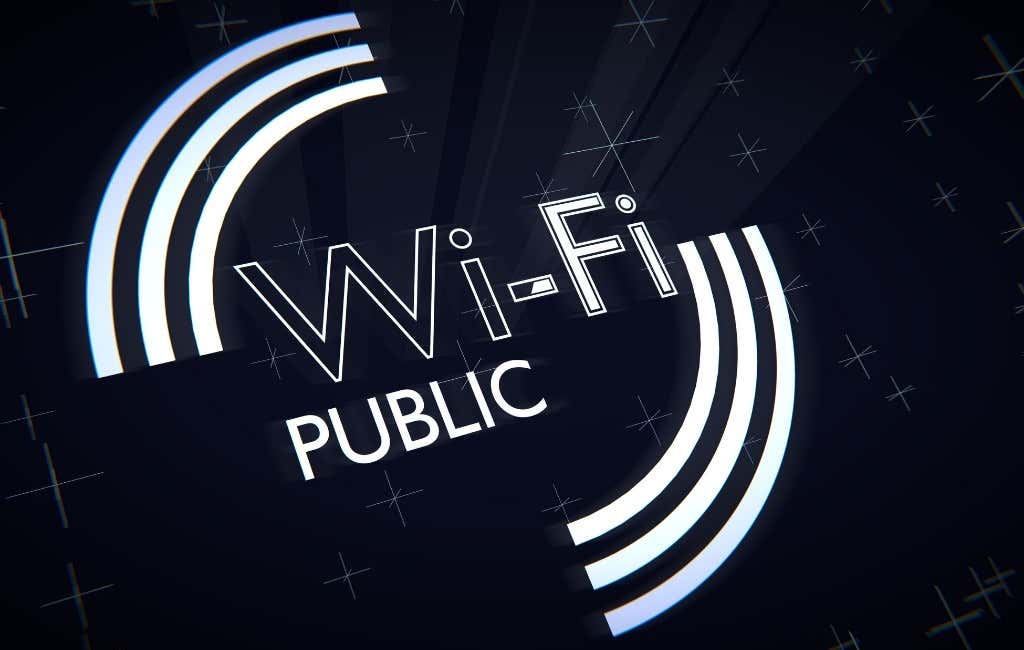A VPN (virtual private network) is a service that encrypts your internet traffic to provide security and privacy when you surf the internet. They’re a great way to protect yourself against hackers when you use public Wi-Fi.
However, do you really need a VPN, especially if you’re only using your home internet connection?
Before discussing if VPNs are useful for at-home use or otherwise, you should know that a VPN is not an ad or tracker blocker by itself. While some VPNs do come with a blocking tool, they can’t, by themselves, protect you from advertisers trying to collect your data.
Do You Really Need a VPN When Using Public Wi-Fi?
When you want to use a public Wi-Fi network, there’s no way to determine which network is safe. It’s mostly guesswork, so you can never tell which network the bad guys are using to snoop on your online activity.
They use a name that’s similar to a coffee shop or retail store nearby to trick you into connecting to a network. Once you’re connected, they use man-in-the-middle attacks to monitor your internet traffic. This means if you use your credit card or online banking account, a hacker might be able to steal that information.

More sophisticated attackers go a step further and configure the access point such that it will change its SSID based on an SSID that the device is searching for.
In such instances, a VPN service can provide protection against data breaches by creating an encrypted tunnel that no one, including the network administrator, will be able to monitor. The level of encryption differs among VPN providers, but AES-256 is pretty much a standard now.
Do You Really Need a VPN at Home?
An attacker is far less likely to execute a man-in-the-middle attack on a home network because it’s a lot more effort to break in and replace someone’s router. It’s not a hacker you need to worry about with your home network; it’s your ISP (Internet Service Provider).
The U.S. Congress decided to roll back the FCC protections in 2017, and ISPs have since been able to legally sell customer data. ISPs need to provide an opt-out clause, but a customer needs to disallow data collection manually By default, the ISPs have permission to collect data.
For this reason, investing in a good VPN isn’t entirely futile, even if you’re on a home network. Remember that there are still ways you can be tracked online even if you use a VPN, but it won’t be your ISP collecting your data.
Do You Really Need a VPN for Streaming Services?
VPNs aren’t just helpful for the security of personal data and online privacy; they’re also useful when you want to access geo-blocked content.
For instance, think about Netflix. Netflix will offer a different library of content based on your location and the distribution rights it has for specific content. So, if you’re accessing Netflix from the U.S., you’ll automatically have access to the U.S. library, which might not have some of your favorite Italian or Indian sitcoms.
The same is the case with Amazon Prime Video, Hulu, and most other services.
The easy solution? VPNs.
When you connect to a VPN server, you’ll be allocated a different IP address. When you access a website using a VPN, the website will read the server’s IP address and assume that as your physical location, even though it might not be.
You can also use VPNs to unblock services you can’t access at all. For instance, if you want to access a foreign streaming service like Hotstar that isn’t currently available in the U.S., you can use a VPN to acquire a British or Indian IP address to access it.
Best VPNs
Even premium VPNs like ExpressVPNs don’t cost more than a few dollars each year. While there are free VPNs out there, too, many of them have questionable logging policies. The following are some of the best VPNs you can choose.
1. ExpressVPN
ExpressVPN is one of the best VPNs out there. It’s expensive but comes with all the bells and whistles, including a kill switch and in-app split tunneling.
A kill switch makes sure that your IP address isn’t exposed should the VPN connection be interrupted. In-app split tunneling allows you to use the encrypted VPN tunnel for specific apps, while you can use the unencrypted tunnel for other apps.
It has an easy-to-use interface, a client for almost all operating systems, and offers unlimited bandwidth. However, it doesn’t offer dedicated IPs.
If you’re looking for a VPN that can deliver a top-notch streaming experience, ExpressVPN might be a good choice. It can bypass geo-blocks on websites like Netflix and Amazon Prime Video with ease. However, if you want a VPN for torrenting, consider NordVPN.
2. NordVPN
If you’re big on torrenting, NordVPN is your best bet. It has custom P2P servers that make NordVPN more equipped to support torrenting and offer better protection. Plus, NordVPN also offers double-hop servers (i.e., using two servers instead of one) that add another layer of security.
NordVPN offers excellent speeds and has one of the largest server networks (more than 5,000 servers) of any VPN out there.
It also has an excellent browser extension, which means you can use the VPN from Chrome, Firefox, or any other browser without installing the app. Alternatively, you choose to install the desktop or mobile client on your Windows, Mac, Android, or iOS device.
NordVPN also comes with a malware blocker—something that’s missing from ExpressVPN—but it can’t replace your antivirus entirely. It’s also priced significantly lower than ExpressVPN.
Do You Really Need a VPN When Tor Exists?
Tor (short for The Onion Router) is a free network of access points referred to as nodes. You can use the Tor browser to connect to the network and surf the internet anonymously. You can try Tor yourself by downloading the browser from the Tor website.
Traffic that passes through the Tor network is encrypted, so it offers online security, but it’s still a free network that’s run by volunteers who have access to your traffic. Tor has also been under the government’s radar because it’s a popular choice among cybercriminals.
There are some usability concerns with Tor as well. It doesn’t support P2P connections and is painfully slow, which means it can’t deliver a good streaming experience.
While Tor can offer better cybersecurity than an unprotected internet connection, it can’t match a VPN’s security. You can also combine Tor and VPN use to get the best of both worlds.
Final Thoughts: Do You Really Need a VPN?
Do you really need a VPN? Well, in most cases, you’ll do fine without a VPN, especially if you only connect to your home network. However, that’s not to say that they can’t offer value for at-home use.
A secure VPN keeps your private data safe when you’re online and helps you access content that’s otherwise unavailable in your region. If you connect to a lot of public Wi-Fi hotspots, a VPN connection will make sure a hacker can’t steal your information.
When you compare the cost benefits, it does make sense to invest in a VPN and use a secure connection, especially if you use public networks or stream a lot of content from foreign websites.




